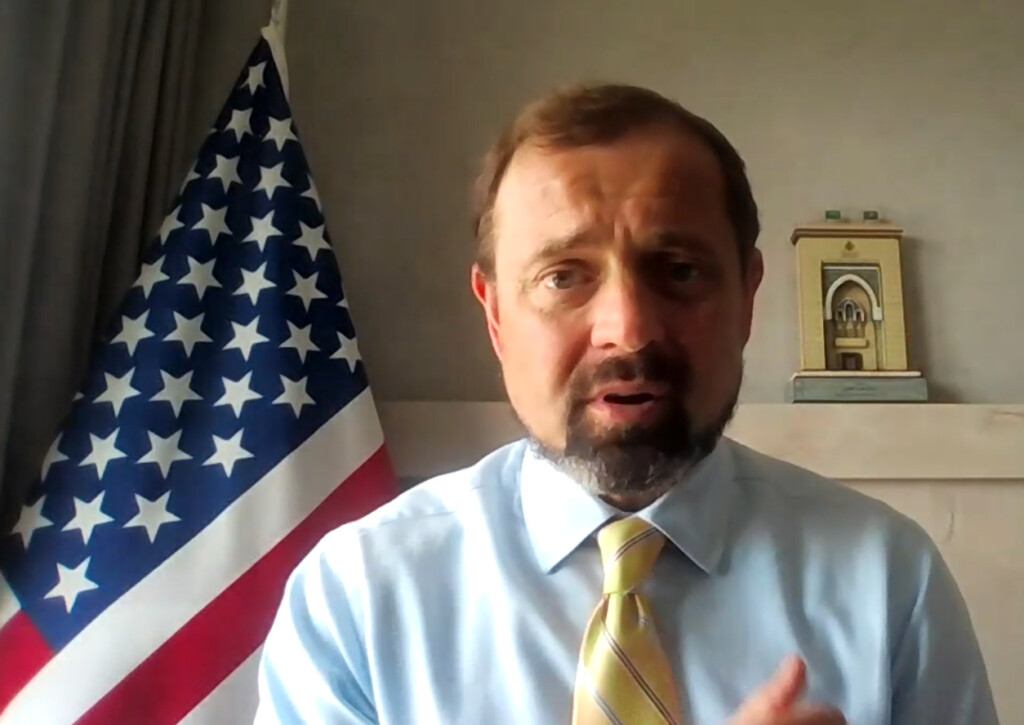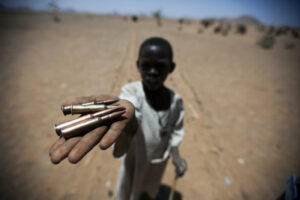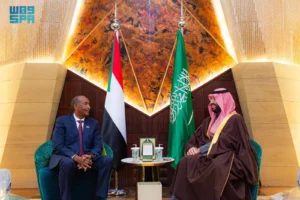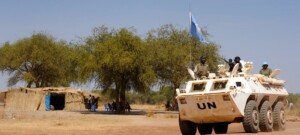‘Intervention forces’ part of US Envoy’s new roadmap to end Sudan conflict

US Special Envoy to Sudan, Tom Perriello, speaks in an exclusive interview with Radio Dabanga in September (Screenshot: RD)
The US Special Envoy to Sudan, Tom Perriello, is developing a roadmap that would reduce tensions and stop the ongoing conflict in Sudan, placing the greatest emphasis on protecting civilians from the violations they are subjected to by the two parties to the conflict, the Sudanese Armed Forces (SAF) and the Rapid Support Forces (RSF), Suleiman Siri reports for Radio Dabanga.
This plan comes within the framework of the US envoy’s serious efforts to make his mission to stop the conflict in Sudan a success, by ceasing hostilities and pressuring the warring parties to return to the negotiating table following the failure of the Geneva talks, which were boycotted by the SAF. In an interview with Radio Dabanga following the talks, Perriello lauded the energy at the discussions as “very, very positive,” and stressed that the diplomatic coalition “is determined to produce results for the Sudanese”… This in spite of the “tragic” refusal of the Sudanese Armed Forces (SAF) to attend the talks.
On Wednesday, Perriello told a meeting with a group of journalists and representatives of civil society organisations in the Kenyan capital, Nairobi, statements about opening channels of communication with the African Union regarding its preparation to prepare and equip forces for intervention, with the aim of protecting civilians in Sudan.
The focus on a possible peacekeeping force follows the first report by the UN’s Independent International Fact-Finding Mission for Sudan, published in September, which calls for “an independent and impartial force with a mandate to safeguard civilians be deployed without delay”.
The US envoy’s statements coincided with a visit by a delegation from the African Peace and Security Council to the administrative capital, Port Sudan, the first since 2015, and its involvement in a series of meetings with Sudanese officials.
It is not unlikely that the delegation’s discussions with the officials will address the US envoy’s proposal to deploy international forces to protect civilians, especially since the targeting of civilians by both sides has become a complex issue that has preoccupied regional and international public opinion, and scenes of immediate executions, slaughter, evisceration of bellies, and other crimes and violations have called for the search for a mechanism to protect civilians.
The opinions of experts surveyed by Radio Dabanga varied regarding the statements of the US envoy and the possibility of deploying international forces by the African Union, as some civil society organisations have been demanding. However, this option is faced with many complications, especially since Sudan has a previous experience in deploying international forces that is still being evaluated. Some believe that it was successful, while others believe otherwise.
A successful experience
While media expert and former spokesperson for the United Nations mission in Iraq, Khaled Dahab, sees the possibility of the success of deploying international or African forces to protect civilians in Sudan, retired Sudanese Ambassador Abubakr Hussein rules out the possibility of the success of the idea of deploying international forces to protect civilians in Sudan, and attributed this to the divergence of positions between the two parties to the conflict.
Dahab told Radio Dabanga yesterday that the idea of bringing in international forces to break up the conflict between the conflicting parties is an experiment that has been carried out in many countries, some of which succeeded and others did not, noting that each country or war has its own circumstances.
He expressed his belief that in Sudan, there is currently no will by both parties to the conflict to stop the war or cease fire, and each party insists on resolving the conflict militarily, “which is impossible to achieve”.
Deploying international or African forces to protect civilians might succeed in Sudan, he said but several obstacles must be taken into consideration, “first of all the large geographical area of Sudan, which is vast. International forces deployed in such a large territory must be in large numbers so that they can cover those areas.
“Secondly, if there is no will from the belligerents and they do not submit to the conditions of the ceasefire and not harming civilians, it becomes difficult for the international forces to succeed in carrying out their duty. They will not be deployed to engage with the warring parties, but to protect civilians and disengage between the warring parties. So the belligerents must consent first.”
Dahab considers the option to intervene by force as “very difficult if not impossible, taking into account the expansion of the war in Sudan”.
Declining interest in Sudan
Retired diplomat Abubakr Hussein disagrees with Dahab, and rules out that international forces will be able to protect the people in Sudan.
He attributes this to the divergence of positions between the two parties to the conflict. “The Sudanese army insists on implementing the Jeddah decisions, while the RSF talks about democracy, peaceful transition, and returning civilians to power,” he told Radio Dabanga.
“Moreover, international forces, especially if they are African, will not succeed,” the ambassador said. “Sudan’s membership in the African Union has been frozen since the coup of October 25, 2021.
“If the African Peace and Security Council delegation during its current visit to Port Sudan puts forward a proposal to deploy international protection forces to protect civilians, the first thing de facto government will do is confronting them with the necessity of lifting the freeze on Sudan’s AU membership,” he said. “The government in Port Sudan earlier said that they do not consider that what happened to be a coup, deserves the AU membership to be frozen.”
Ambassador Hussein believes that Sudan needs international aid organisations to distribute relief supplies. “Each party, however, is trying to impose its point of view on how these relief supplies should be directed to those civilians who deserve them.
“The distribution of aid requires that the two parties to the conflict strip themselves of their narrow views and prioritise the dire need of the people in Sudan for aid, in particular in Darfur.”
He expressed his hope that “both sides will be considerate and respond to international requests and resort to negotiation to agree on a specific mechanism that will lead to alleviating the suffering of the people in areas where war is raging”.
Aid sanctions eased
As reported by Radio Dabanga on Friday, the Sudanese government welcomed US President Joe Biden’s decision to lift certain restrictions imposed under the US Anti-Trafficking in Persons Act of 2000. This allows Sudan to access US development aid and benefit from the United States Agency for International Development (USAID) Global Health Programme.
On September 30, the White House released a memorandum indicating that US President Joe Biden had partially exempted Sudan, Afghanistan, Cambodia, and South Sudan from restrictions on development aid and global health programmes.
This decision comes despite Sudan moving from Tier 2 to Tier 3 in the US State Department’s 2024 Trafficking in Persons (TIP) report, a classification that could expose the country to sanctions or reduced aid. Tier 3 countries are identified as not making sufficient efforts to combat human trafficking and not complying with the US Trafficking Victims Protection Act of 2000.
Sudanese Foreign Minister Hussein Awad, through a statement by the Transitional Sovereignty Council’s spokesperson, hailed the decision as a key step forward in US-Sudan relations. In the statement issued yesterday, Awad said the aid would support Sudan’s reconstruction, particularly the rebuilding of its war-damaged health sector. He also called on the US government to take further measures to help Sudan address its urgent needs, given the ongoing war and recent natural disasters.
The Sudanese Committee for Combating Human Trafficking said in a statement seen by Radio Dabanga yesterday that the US decision reflects an understanding of Sudan’s humanitarian situation, which has led to the world’s largest displacement crisis.
The statement noted that despite Sudan’s Tier 3 status, national efforts to combat human trafficking persist under difficult circumstances. It also affirmed its cooperation with international mechanisms in the fight against human trafficking.
Former MP Mehdi Daoud, speaking to Radio Dabanga from the US, said the decision reflects American interest in Sudan’s development and health sectors. He explained that while many expected the US to impose stricter sanctions on Sudan, the decision to lift some restrictions considers Sudan’s war and humanitarian crisis.











 and then
and then